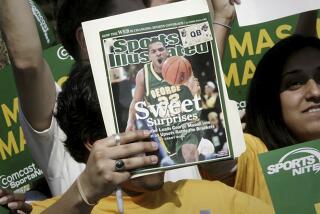Say No to Advertisers as Editors
- Share via
Whom do you want dictating what you read? The people who make Huggies diapers? Jeep? Ajax? Probably not. Yet big corporate advertisers increasingly have been trying to have their say in the editorial process.
The trend was revealed in the form of a letter quietly sent by Chrysler Corp.’s ad agency to 100 top magazines. Chrysler, it said, needed to be informed, in advance, of “any and all editorial content that encompasses sexual, political, social issues or any editorial that might be construed as provocative or offensive.” The auto giant then would decide whether to pull its ads. After the letter was made public and it became apparent that Esquire had decided not to run a fiction piece rather than risk offending Chrysler, a great uproar followed, with the American Society of Magazine Editors and the Magazine Publishers of America issuing a rare joint statement condemning both Chrysler’s stand and the broader pattern of advertiser meddling. Chrysler, under tremendous pressure, announced that it no longer would hold to such a policy.
But it is too early to declare victory in the battle over censorship. Many other companies continue to insist that there is nothing wrong with their communicating their tastes to the magazines, newspapers, radio and television outlets that they patronize. And even Chrysler got in another little jab, noting that it instead will reduce the number of places it advertises and scrutinize their content more aggressively.
Why does all this matter? Why shouldn’t an advertiser be free to pick its editorial environment? It should. But there is a big difference between, say, preferring People over Harper’s and seeking direct influence at People or Harper’s. Requesting a “sneak preview” amounts to a kind of insidious prior restraint. Because when a sponsor sees something it doesn’t like, publishers, under pressure to maximize profits and not lose a single page of advertising, will be inclined to steer clear of the offending material.
And what might that be? Almost anything that could be considered upsetting. Diaper manufacturer Kimberly-Clark doesn’t want its product near any articles that cannot be considered “happy baby” material. If every advertiser had such requirements, parents would not have access to vital information about sudden infant death syndrome. The same is true with other “downer” material about, say, problems with race relations or sexually transmitted diseases or land mines. A Chrysler spokesperson nicely summed up the problem, declaring to the Wall Street Journal that “when you are looking at a product that costs $22,000, you want the product to be surrounded by positive things. There’s nothing positive about child pornography.”
No problem is positive. That truism explains exactly why journalists who report on society’s woes don’t want either weak-kneed editors or heavy-handed advertisers looking over their shoulders. With a narrow bottom-line agenda and the ability to profoundly affect publications’ profitability--Chrysler alone spent $270 million at magazines last year--advertisers can suppress discussions vital to informed consent in a democratic society.
In this sponsored world, where precious little is safe from the corporate imprint, it gets harder to remember the original purpose of anything. News publications, for example, are for news: often unsettling, sometimes positively devastating. Advertisers may keep these media afloat, but that doesn’t mean that they should manage them.
Advertisers get plenty of benefits from visibility. We, their customers, might remind them that this business is a two-way street: The more corporations try to cut off our flow of information, the more inclined we may be to cut off the flow of their products by shopping elsewhere. If it has all become about money, then those of us who spend it ought to have some say as well.
More to Read
Inside the business of entertainment
The Wide Shot brings you news, analysis and insights on everything from streaming wars to production — and what it all means for the future.
You may occasionally receive promotional content from the Los Angeles Times.










